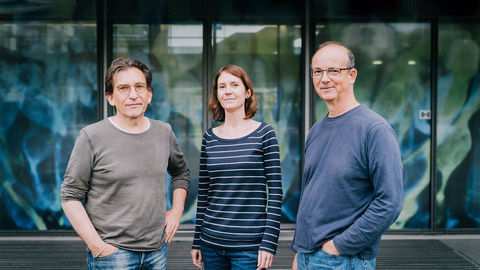Oct 26, 2022
From Lab to Business: CRTD Researchers receive BMBF GO-Bio Initial Funding

Prof. Michael Sieweke, Dr. Anke Fuchs, and Dr. Ludwig Englmeier (from left to right) © TUD/ Magdalena Gonciarz
Researchers from Dresden receive 1 million Euro funding to develop and bring novel cell therapies into the market. The top-tier funding initiative GO-Bio of the German Federal Ministry of Education and Research (BMBF) will support Prof. Michael Sieweke and Dr. Anke Fuchs from the Center for Regenerative Therapies Dresden (CRTD) at TU Dresden and their clinical partner, Prof. Martin Bornhäuser from the University Hospital Carl Gustav Carus Dresden, in developing macrophage-based immunotherapies for solid tumors.
Cell-based Immunotherapies are a relatively new therapeutic approach in which human immune cells are specifically engineered to accurately identify and destroy tumors. In recent years, immunotherapies based on engineered T-cells have proven to be exceptionally successful in treating a number of blood cancers. They have however not been effective for solid tumors.
The researchers from Dresden believe that another type of immune cell is the key to solid tumor treatments. “Macrophages are immune cells that have the ability to move into solid tissues. They clear our bodies from bacteria, viruses, and cell debris and can infiltrate tumors. Their unique ability to enter tumors makes them a perfect tool for the new treatments,” says Prof. Sieweke, Alexander von Humboldt Professor and research group leader at the CRTD.
Top-Tier Funding for Technology Transfer
The GO-Bio initiative is one of the most sought-after funding measures for Life Sciences spin-offs. It was developed by the BMBF to support the researchers on the path from an idea to a market-ready drug.
The GO-Bio initial funding program will support CRTD researchers with 1 million euro. The funding will be equally spread into macrophage research in the Sieweke research group and clinical translation towards application in Fuchs and Bornhäuser laboratories.
The Sieweke group has recently shown that macrophages can be expanded in the laboratory, a big step towards using these cells for therapies. “Cell-based therapies are a rapidly expanding area of medicine. And macrophages, as innate immune cells, possess a broad spectrum of cellular functionality, making them very interesting as clinical candidates,” says Dr. Ludwig Englmeier, Intellectual Property manager of the project in the Sieweke research group.
“We are very excited to team up with the Sieweke lab to facilitate clinical translation of such an innovative and promising cell product. Based on our experience in developing advanced cellular therapeutics, we will now start to upscale the manufacturing process using clinical grade reagents,” says Dr. Anke Fuchs, research group leader at the CRTD and fellow of the Mildred Scheel Early Career Center (MSNZ).
About the BMBF GO-Bio initial Funding Program
The BMBF GO-Bio initial program supports research projects that identify and develop ideas for the commercial exploitation of life sciences research, preferably in relation to “therapeutic agents”, “diagnostic reagents”, “platform technologies” and “research tools” from their conceptual design to assessment of feasibility and evaluation of possible options for commercial application.
